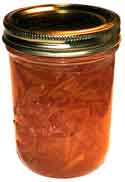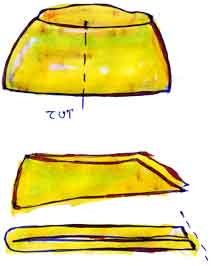Orange Marmalade

General:
The main recipe here is for Marmalade made with Saville oranges. Alternative quantities are provided in the case of the unavilability of Saville oranges. Saville oranges may be more easily located if identified as 'Sour Oranges'.
This set of recipies is based on a 10-cups-of-liquid ('juice') (before reduction and excluding rind) batch.
Use Valencia Oranges or some juice orange maybe from your garden tree for the juice in stead of water that is sometimes needed using sour oranges to bring the amount of juice up to 10 cups.
Determine the amount of sugar to use by weighing the reduced 'soup'. Use equal amounts reduced soup to sugar by weight.
Approximate conversions
Large Valencia Orange = 2-1/2 - 2-3/4" dia.
Large Saville Orange = 2-1/2 - 3" dia.
3 large Valencia = 1 cup
4 large Saville Oranges = 1 cup
10 small poor quality Saville Oranges = 1 cup
Ingrediants:
Various combinations to provide flexibility in case of scarcity or variation in fruit size. If it is necessary to go '100%' non-Seville oranges, increase the number of lemons.
Lemon rind and Saville Orange rinds do not count towards volume of initial soup; sliced Saville Orange rinds do count when measuring for sugar.
Preferred Recipe Tart:
42 Large Saville Oranges
Sugar*
Tart II:
42 small low quality Saville Oranges = 4-1/2 cups juice
juice of 8 large Valencia Oranges = 4 cups
1 lemon
Sugar*
Tart III:
24 large Saville Oranges = 6 - 7-1/2 cups juice
10 large Valencia Oranges = 3-3/4 -4 cups juice
1 lemon
Sugar*
Sweet:
6 Large Saville Oranges
1 lemon
24 Medium Valencia Oranges
Sugar*
Rich Sweet:
6 Large Saville Oranges
1 lemon
15 Large Navel Oranges
Sugar*
You should use a preserve kettle for the reduction. You will also need 2 large bowls and a scale that can be set to zero [tared] with a bowl on it.
Recipe
Prepare 5 or 6 pint jars with lids and rings in a pressure cooker. Begin heating the pressure cooker when you begin processing the oranges on the second day. You want the jars to be thoroughly sterilized at exactly the same time as the marmalade is complete and still boiling for the final hot water bath you give the full jars.
1. Scrub the fruit well, cut into halfs.
2. Juice the oranges and put the juice in the kettle.
reserve 14 good looking half rinds. With Saville oranges go for knarly but without flaws.
[If using a variation that calls for a lemon: Juice the lemon, put the juice in the kettle and put the rinds to one side.]
3. Cut off the ends and ugly bits of the reserved Saville orange rinds [and lemon if using a lemon] [anticipate the likelihood that you will not find enough flawless Saville oranges and have enough good rind to equal about 6-7 large oranges]; and examine the insides for seeds and remove the seeds but not the pulp and put all of this in the kettle.
4. Bring the soup to a boil and boil on Medium High for 5 minutes.
5. Let stand covered for 12 to 24 hours in a cool place.

6. Remove the rinds and scrape out the pulp
[Hint: use a grapefruit spoon/knife]
put the pulp into a sive placed over a bowl and press out the liquid. NOTE: a better way needs to be found to extract the juice from the pulp!
7. Cut the rinds of the Saville oranges into very thin shreds; [disgard the lemon rinds]. You need shredded rind from about 6-7 large oranges to give each of 4 or 5 pints of marmalade a good proportion of rind.
[Hint: cut the half-fruit rinds with end bits cut off (making a do-nut like shape) through one side and double it up to slice two-up; use a very sharp knife]
put shredded rind back in the pot.
8. Bring the soup with shredded rinds to a rolling boil and boil uncovered 1 hour at medium high or until the soup looks good and rich and the rind is easily mashed between two fingers [this could be in as little as 1/2 hour] and is almost translucent. It could take more than one hour depending on thickness of the shredded rind, etc.
* 9. Measure out the sugar. The reduced soup is what is weighed to determine the quantity of sugar. Equal amount of sugar to juice and fruit ('soup').
At this point if you are using only one preserve kettle, it is a good idea to give the kettle a good cleaning and thorough rincing.
10. Add the sugar to the soup in the preserve kettle and bring to a rolling boil stirring continuously to avoid scorching at as high a temperature as possible without boiling over.
Avoiding boiling over is one good reason to get a preserve kettle!
BE CAREFUL! It is not being over-cautious to wear eye-protection; wear leather shoes, do not work barefoot; wear rubber gloves when stirring. Boiling hot sugar burns badly and spatters while cooking.
Continue cooking and stirring until some thickening and darkening of the liquid is noticed jelly-like clumps at the sides of the kettle are a good hint. This could be in as little as 10 minutes using 100% Saville oranges per this recipe; using only Valencia or juice oranges it could take 20-25 minutes. A better measure is to use tempeature rather than time: done to jam thickness is 220°.
Over-cooking gives a worse outcome than undercooking! Over-cooking will give you rock candy stuck inside the jar; undercooking will at least give you syrup you can use for other purposes.
The best way to determine doneness is by sight and feel that is, experience. Other tests are to place a small amount on a cold plate and after a moment or two if it forms a skin when pushed with a spoon, it's done. Another is to lift out a spoonfull and allow it to drip off the side. If it drips off in two streams, it's done. [This latter is not easy to see, the second stream may be very short and pass very quickly. I've never relied on it myself.]
11. Remove from heat
12. Skim off any 'scum'
13. Ladle into hot jars
14. place on caps and rings...'finger tight'
15. place in hot-water bath (pressure cooker closed but not under pressure) and process for 6-10 minutes
remove from hot water bath quickly and listen for the 'pops' of the lids sealing. If one does not pop, use that first. There is little to no danger of botulism with marmalade as the acid level prevents its growth.